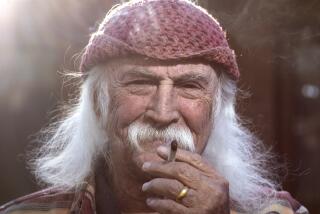Mellow Romance From Vandross
- Share via
Luther Vandross likes to sing of his love reaching to the moon and the stars, yet he’s a romantic who keeps his distance. He’s a smooth operator with a voice of genuine power and personality, but whose chosen approach is R&B; at its softest and, generally, its least revealing.
Though Vandross began his recording in the ‘70s doing session work for such artists as David Bowie and Chaka Khan, the New York native epitomizes the glossy sound of ‘80s R&B.; And that’s what he offered at the Universal Amphitheatre on Friday, the first of two dates at the venue. He is still more romantic crooner than passionate soul stirrer.
This approach sets him apart from his competition in the new generation of R&B; singers, many of whom draw inspiration from the monumental ‘70s work of Al Green, Curtis Mayfield and Marvin Gaye. In a genre now defined by the smoldering voices of Maxwell, Bilal or Alicia Keys, the music of Vandross sounds more conservative than ever.
It’s not a matter of age, but style. While these younger singers mix traditional soul with an awareness of hip-hop, Vandross ignores both. His music contains elements of gospel and jazz, but he first conquered the charts at the moment mainstream R&B; lost the funk, trading feeling for studio technique--a change that left such a void that the rise of hip-hop was almost inevitable.
On Friday, Vandross’ music was agreeable, easily digestible romantic pop. Though he did cut loose with the occasional dance step and discreetly toweled the sweat from his face, his manner was always controlled. That worked to his advantage when married to elegant melodies, as in his performance of the moving epic, “Superstar/Until You Come Back to Me (That’s What I’m Gonna Do),” and less so elsewhere.
Vandross performed for more than two hours with a comforting ease, and his songs benefited from the warmth of his six-man band and five backup singers. The absence of studio gloss was especially welcome when he was unexpectedly joined by Gregory Hines for their 1987 hit, “There’s Nothing Better Than Love,” and during “Can Heaven Wait,” a song from his new, self-titled album that balanced acoustic guitar with a voice filled with regret.
The singer, whose new collection on Clive Davis’ J Records has sold more than 800,000 copies, was a pleasant, even playful host, joking about forgetting a bass player at a highway rest stop or recounting a recent concert where a couple of newlyweds were invited onstage to be serenaded with his 1989 hit “Here and Now.”
“They loved it--because I only charged them $75,” he said with a grin. “I’m not that sentimental.”
More to Read
The biggest entertainment stories
Get our big stories about Hollywood, film, television, music, arts, culture and more right in your inbox as soon as they publish.
You may occasionally receive promotional content from the Los Angeles Times.










